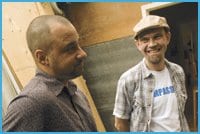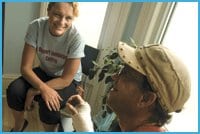
A NECESSARY ENTERPRISE. Owner Dominic Cramer (foreground) and membership coordinator Chad Cooke take a break from the renovations. Credit: Tony Fong photo
On the day before opening its new location in the Church-Wellesley village, the staff of the Toronto Compassion Centre (TCC) take a break from last-minute renovation work. The air smells like paint and pot as project coordinator Tracy Curley rolls a joint for membership coordinator Chad Cooke. It seems, to this reporter, a little early in the day to spark up a blunt but, “We’re medicating,” explains manager Willow Bauer.
TCC’s mission is to help people struggling with illness to access medical marijuana. The staffers here are members themselves.
“We’re sick people helping sick people,” says Bauer, a small slim woman with short dark hair and funky glasses.
For Curley, whose red hair matches her name, weed helps her live with diabetic neuropathy. “Sometimes I can’t feel my feet,” she says. But by using pot, “I function better now in my 30s than I ever did when I was younger.”
Dominic Cramer is the entrepreneur behind TCC. The staff treat him with reverence. Dubbed “the mayor of Yongesterdam,” he is the founder and owner of the Toronto Hemp Company on Yonge St. Since his start in 1994 Cramer has spun his hemp business off into a small network of shops and cafes with TCC, he says, rising out of an obvious need.
“I had old ladies call up, saying pot saved their sons. He’s got leukemia, AIDS, whatever, and they’ve seen these incredible benefits. ‘Where do I get some?'”
He calls TCC’s move to the gay village “a homecoming.”
“The Toronto Hemp Company has been a sponsor of Dirty Bingo for 16 years,” says host Shirley, whose dirty bingo has been a village staple for years. “They donate a bong every week.”
TCC also had a float in the Pride parade with its own spin on the rainbow flag.
“Green was legalization, red was regulation, yellow was education, orange was medication, purple was pride and blue was compassion,” says Curley. “That’s what we strive for.”
But is it just savvy public relations by a smart businessman? Is it merely fancy window dressing for a drug den?
Cooke says 42 percent of TCC members are people living with HIV/AIDS. Curley estimates that as many as a third of the members are gay men.
“From a quality of life point of view anything that will help people with HIV manage their medications better and lead quality lives is a very good thing and it’s something that ACT has always supported,” says John Maxwell, director of special projects at the AIDS Committee of Toronto.
But the government doesn’t see it quite that way.
Paul Spendlove, media relations officer for Health Canada, says no matter what benefits they may provide to the sick, “Compassion clubs are unregulated and have always operated outside Canadian laws. These clubs have no legal authority to provide access or to produce and distribute marijuana.”
The legal status of marijuana in Canada seems as hazy as a room full of smoke. Two federal commissions, in 1972 and 2002, recommended outright legalization of marijuana arguing that black-market crime from prohibition is a greater threat to Canadians than the drug. The last Liberal government planned to decriminalize possession of small amounts for personal use but since the Liberals were voted out no one in Ottawa is leaping to make a change.
Prime Minister Stephen Harper has said, “A Conservative government will not reintroduce the Liberal plan to decriminalize the possession of marijuana.” Last fall federal Health Minister Tony Clement unveiled a $64-million antidrug strategy and declared, “The party’s over.”
Such tough-on-crime posturing angers drug prevention and treatment advocates like Maxwell. “Where is the money for treatment?” he asks. “It’s all going into law enforcement.”
With government unwilling to budge, it has fallen to the courts to prod policy. In the summer of 2000 Ontario Court of Appeal Justice Marc Rosenberg ruled that marijuana possession laws violate the rights of sick people who need medical marijuana.
Ottawa responded by creating the Marihuana Medical Access Regulations (MMAR) — essentially growing and selling pot itself. Those who, with physician support, demonstrate a need for weed are licensed to access the government’s stash.
“It was either that or lose the entire prohibition law,” says Cramer.
But Cooke says TCC is necessary because the government system doesn’t work.
“It’s like they set it up to fail, especially considering that they’ve been court-ordered…. They do it reluctantly and badly.”
In January federal deputy judge Barry Strayer agreed, noting that a mere 2,432 people held a licence for government marijuana. It’s important, he ruled, “for qualified medical users to have reasonable access.”
“The bottom line is that the government should not be in our bedrooms and it should not be making our healthcare decisions for us,” says Cramer. “People should be free to use whatever medicines they and their doctors feel will help them.”
As a group the TCC staff make for very charming criminals.
Each workday, says Curley, “I have to ask myself if I’m prepared to be arrested today.”
It’s worse than that, says Bauer. “Every single day you walk in, you realize that not only do you have to worry about law enforcement possibly coming in and shutting us down but also people on the street who don’t care that we’re ill and could come in and hurt us.”
Bauer’s fear comes from experience.
On Dec 20, 2001 five masked thugs burst into a former TCC location near St Clair and Bathurst and brutally beat and robbed members and staff.
“It was not a nice situation,” remembers Cooke. “People were tied up. We learned a valuable lesson that day.”
The police responded but wound up seizing what marijuana and money the attackers didn’t get. The police raided the place again a few months later.
The attack and subsequent police raids is why the staff want to keep the precise village location of TCC a secret. Xtra has agreed not to publish the address or outside photos but the place is not hard to find for anyone determined to do so.
New members go through an online or telephone application process before they learn the location. On entering, TCC visitors pass under video cameras and through three sets of locked doors.
Cooke calls the village “the promised land. This is one community we know will accept us.”
“I believe that we’re more protected in this area than we’ve been in all three locations,” says Bauer. “I know that if we were arrested, many of our members would be down here with picket signs.”
But if TCC and its members could be magnets for crime and police, like Toronto’s gay bathhouses once were, what do Church St residents have to say about the new neighbours?
“I have no problem with a compassion centre opening by my house,” says one. “It’s certainly better than having a grow-op or needle exchange centre next door.”
David Wootton, coordinator for the Church-Wellesley Village Business Improvement Area says, “They’re completely welcome.”
Paul Bourassa has been a TCC member for about seven years and says the mixture of HIV meds and chronic pain was making him sick before his partner got him on marijuana.
“I ate edibles, smoked pot, and it gave me an appetite and kept me calm,” he says. “I could have a normal day and do my normal work.”
He’s lucky, however, that his doctor agreed. The MMAR rules are strict and many doctors won’t bother.
“Essentially it’s illegal, right?” says Maxwell. “I’d guess there are a number of physicians who work with large populations of people with HIV who won’t say anything publicly to support the use of medical marijuana but recognize that if it helps their patients’ adherence to taking HIV meds, obviously say, ‘Go ahead and do it.'”
Catherine Clarke, senior communications coordinator at the College of Physicians and Surgeons of Ontario, says “doctors are expected to use their best judgment,” pointing out that the college’s official policy is, “Physicians are not obligated to complete a medical declaration under the MMAR. Physicians who choose to do so are advised to proceed with caution.”
Spendlove says “current scientific evidence does not establish the safety and efficacy of cannabis.”
“Studies,” scoffs Curley. “Marijuana has been around for thousands of years.”
“We’ve had MS patients come in here in wheelchairs; six months down the line I see them walking without a cane,” says Bauer. “It’s become manageable.”
Ultimately, she says, marijuana is “just a tool to gain quality of life back. Medical marijuana will not save someone from cancer, it won’t save someone from HIV. We can’t cure people but what we can do is put a smile on their faces and allow them to keep what they have. Whatever dignity, whatever compassion, whatever love they have for themselves, they can keep.”
With about 2,100 members — “and growing!” cheers Cooke — the Toronto Compassion Centre staff say they are thrilled to continue their work in the Church St neighbourhood.
“We’ve been waiting for this for a long time,” says Curley. “This location has given us so much support. The village is going to pot!”


 Why you can trust Xtra
Why you can trust Xtra


